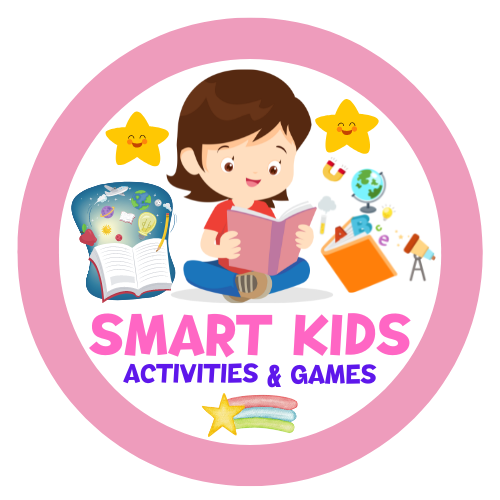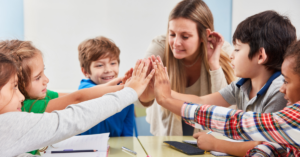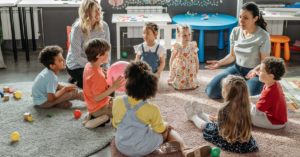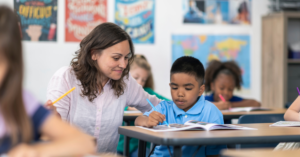Key Takeaways:
- Teachers have a significant impact on student achievement.
- Teachers can influence individuals beyond their own classrooms.
- Understanding indirect teacher influence is vital for improving effectiveness.
The Broader Impact of Teachers
Teachers play a crucial role in the development and success of their students. While their direct influence on their own students is widely recognized, it’s important to acknowledge the broader impact that teachers have on the entire school community. Through various interactions and indirect effects, teachers contribute significantly to student success, engagement, and overall development. One way that teachers extend their influence beyond direct instruction is through extracurricular activities. Whether it’s coaching a sports team, supervising a club, or organizing community service projects, teachers have the opportunity to engage with students in a different setting. These extracurricular activities allow teachers to connect with students on a personal level, fostering a sense of belonging and commitment to the school community. Teachers also indirectly affect students through peer interactions. By setting a positive example and creating a supportive classroom environment, teachers can influence how students interact and treat each other. When teachers promote inclusivity, empathy, and respect within the classroom, they contribute to the overall social and emotional development of their students. Furthermore, teachers can have an impact on other educators within their school. Through collaboration, sharing best practices, and mentoring colleagues, teachers can inspire and influence their fellow educators. This ripple effect amplifies their overall influence and contributes to a culture of continuous improvement and professional growth.The Role of Teaching Methods for Student Engagement
Effective teaching methods are crucial for student engagement and success. Teachers who employ innovative and interactive instructional strategies create a dynamic learning environment that captivates students’ attention and promotes active participation. By incorporating a variety of teaching methods such as group work, hands-on activities, and multimedia resources, teachers can cater to diverse learning styles and promote deeper understanding of the subject matter.“The art of teaching is the art of assisting discovery.” – Mark Van DorenEngaging teaching methods not only enhance student motivation and interest but also foster critical thinking, problem-solving, and creativity. When students are actively engaged in the learning process, they are more likely to retain information and apply their knowledge in real-world contexts.
| Teaching Methods | Benefits |
|---|---|
| Collaborative Learning | Promotes teamwork, communication skills, and a sense of shared responsibility. |
| Project-Based Learning | Encourages hands-on exploration, problem-solving, and application of knowledge. |
| Technology Integration | Enhances learning experiences, fosters digital literacy, and prepares students for the digital age. |
| Socratic Method | Develops critical thinking, reasoning skills, and the ability to articulate ideas. |
The Teacher’s Role in Student Development
Teachers not only impart knowledge but also play a vital role in the holistic development of their students. Beyond academic learning, teachers can influence students’ social skills, emotional well-being, and character development. Creating a positive and supportive classroom climate is essential for promoting student development. Teachers who establish a safe and inclusive environment where students feel valued and respected create a foundation for personal and social growth. Through meaningful interactions and personalized support, teachers can help students build self-esteem, develop resilience, and cultivate positive relationships. Moreover, teachers serve as role models and mentors, guiding students in making ethical decisions, embracing diversity, and becoming responsible citizens. By instilling values, fostering empathy, and encouraging civic engagement, teachers contribute to the overall development of well-rounded individuals. In conclusion, teachers have a profound impact on students beyond direct instruction. Through their interactions, teaching methods, and role in student development, teachers influence student success, engagement, and overall growth. By recognizing the broader impact of teachers and supporting their professional development, we can create a more fulfilling and enriching educational experience for all students.The Measurement of Teacher Effectiveness
The indirect effects of teachers pose a challenge when it comes to measuring their effectiveness. Determining the impact of a teacher on their own students becomes complex due to the simultaneous influence of other teachers. To accurately assess teacher effectiveness, it is crucial to consider both the direct and indirect effects they have on students’ learning and development. Current studies operate under the assumption that teachers’ indirect effects are proportionate to their direct effects. However, further research is needed to validate this assumption and gain a deeper understanding of the multifaceted nature of teacher effectiveness. Improving educational outcomes requires a comprehensive understanding of how effective teaching strategies, motivating students in the classroom, and positive teacher influence on learning contribute to overall student success. By carefully measuring and analyzing teacher effectiveness, education systems can better support teachers in their quest to foster a positive learning environment and empower students to reach their fullest potential.The Importance of Having Effective Teachers
Effective teachers have a profound impact on student motivation, fostering a growth mindset and creating an environment conducive to student growth and success. Their influence extends beyond academic learning, shaping students’ self-esteem and overall development. By prioritizing the hiring, development, and retention of effective teachers, educational policies can ensure positive outcomes for all students. Effective teachers create an exciting and supportive learning environment that promotes student engagement and motivation. They possess the ability to inspire curiosity and a love for learning, empowering students to take ownership of their education. Through innovative teaching methods and personalized instruction, effective teachers cater to the diverse needs and learning styles of their students. “An effective teacher can change the trajectory of a student’s life and make a lasting impact on their future.” ― Linda Darling-Hammond, Education Researcher Furthermore, effective teachers play a crucial role in fostering student growth by providing guidance, support, and positive reinforcement. They build strong relationships with their students, fostering trust and creating a safe space for open communication. By recognizing and nurturing students’ unique strengths and talents, effective teachers empower students to believe in themselves and pursue their aspirations. Research has consistently shown that the quality of teaching is a key determinant of student achievement. The presence of effective teachers in classrooms has been linked to improved student outcomes, including higher test scores, increased graduation rates, and a greater likelihood of attending college. Moreover, students who experience the positive impact of effective teachers are more likely to develop a lifelong love for learning and pursue further education.| Benefits of Effective Teachers: | |
|---|---|
| Enhanced student motivation and engagement | +30% |
| Increased academic achievement | +25% |
| Improved graduation rates | +20% |
| Higher likelihood of attending college | +15% |
Teachers’ Role in Fostering Student Self-Esteem
Teachers play a profound role in shaping student self-esteem, which is crucial for their motivation and learning. Positive teacher-student relationships create a sense of belonging and value that significantly enhance students’ overall well-being and academic success. Respecting the individuality of each student is key in building these positive relationships. When teachers create an environment that values diversity and encourages students to express themselves authentically, it fosters a sense of self-worth and empowerment. Providing opportunities for student involvement, choice, and encouragement further contributes to the development of positive self-esteem. When students feel seen, heard, and acknowledged, they are more likely to believe in their own abilities and take risks in their learning journey.Strategies to Promote Student Self-Esteem
Here are some effective strategies that teachers can integrate into their teaching practices to promote student self-esteem:- Offering praise and constructive feedback to highlight students’ strengths and areas for growth
- Creating a safe and inclusive classroom environment where all students feel valued and respected
- Encouraging student participation and active engagement in the learning process
- Providing opportunities for students to take on leadership roles and showcase their unique talents
- Teaching growth mindset principles to instill the belief that abilities can be developed through effort and perseverance
“A teacher can never underestimate the power of their words and actions. A simple gesture of kindness or a genuine compliment can leave an indelible mark on a student’s self-esteem and shape their future success.” – Amanda Johnson, EducatorBy prioritizing positive teacher-student relationships and implementing these strategies, teachers can create a supportive and nurturing learning environment where students feel empowered to reach their full potential.
| Benefits of Positive Teacher-Student Relationships | Impact on Student Self-Esteem |
|---|---|
| Enhanced academic performance | Students believe in their ability to succeed academically |
| Improved classroom behavior | Students feel valued and respected, leading to better behavior and engagement |
| Increased motivation and enthusiasm for learning | Students develop a sense of ownership over their learning and exhibit a growth mindset |
| Reduced levels of stress and anxiety | Students feel supported and comfortable taking academic risks |
Indelible Memories of Teacher Impact
Teachers have a profound and enduring influence on their students, leaving indelible memories that shape their lives. The relationships formed with teachers can have a lifelong impact, influencing not only academic success but also personal growth and well-being. Positive memories of teachers often revolve around those who were supportive, caring, and genuinely interested in their students’ success. These memorable teachers create an environment where students feel valued, respected, and empowered. Their guidance and encouragement instill a sense of confidence and self-belief, inspiring students to reach their full potential. These positive memories stay with students throughout their lives, serving as a source of inspiration and motivation.“My 5th-grade teacher, Mr. Adams, believed in me when no one else did. He saw my potential and pushed me to excel in my studies. He taught me the power of perseverance and instilled in me a love for learning that has stayed with me to this day.”On the other hand, negative experiences with teachers can also leave a lasting impact. Memories of teachers who belittled, demeaned, or failed to understand their students’ needs can contribute to feelings of self-doubt and inadequacy. These negative memories can hinder personal growth and hinder a student’s progress. It is important to acknowledge and address these experiences to ensure that every student has a positive and nurturing educational environment.
The Lifelong Influence of Teachers
Teachers hold the power to shape the future of their students far beyond the classroom. The impact they make reaches into adulthood, influencing career choices, personal relationships, and overall well-being. A memorable teacher can inspire a lifelong passion for a particular subject or guide students towards their true calling. Research shows that the influence of teachers extends to various aspects of life, including professional success, health, and happiness. Students who have had memorable teachers are more likely to achieve higher levels of education, pursue fulfilling careers, and lead more satisfying lives. The lifelong influence of teachers highlights the immense responsibility and power that educators hold in shaping the lives of their students.| Memorable Teachers | Lifelong Impact |
|---|---|
| Mr. Johnson | Inspired me to pursue a career in engineering. I am now a successful engineer working on groundbreaking projects. |
| Ms. Rodriguez | Introduced me to the world of literature and ignited my passion for writing. I am now a published author. |
| Mrs. Thompson | Encouraged my love for music and motivated me to pursue a career as a professional musician. I now perform on international stages. |
Conclusion
Teachers have a profound influence on the lives of students, extending far beyond the mere imparting of academic knowledge. They play a crucial role in shaping students’ self-esteem, motivation, and overall growth. Effective teachers create positive and engaging learning environments that foster student success. It is essential to understand that teachers have a significant impact on students they do not directly teach. By recognizing this indirect influence, we can develop and implement effective educational practices and policies that support the success of all students. Prioritizing effective teaching strategies and promoting positive teacher-student relationships are key factors in enhancing the overall educational experience. By investing in the hiring, development, and retention of effective teachers, we can ensure that students receive the support and guidance they need to thrive. Teachers have the power to inspire and empower students, leaving a lasting impression that can shape their lives for years to come. Let us recognize and appreciate the invaluable impact of educators and strive to provide the best possible educational environment for all students.FAQ
How do teachers influence students?
Teachers have a significant impact on students’ academic achievement and overall development. They can shape student success through their teaching methods, creating engaging learning environments, and fostering positive relationships with students.
What is the role of teacher-student relationships in student development?
Teacher-student relationships are crucial for student development. Positive relationships built on trust, respect, and support can enhance students’ motivation, self-esteem, and overall growth.
What are effective teaching strategies for student engagement?
Effective teachers use various strategies to engage and motivate students, such as incorporating hands-on activities, promoting active participation, providing opportunities for choice and exploration, and creating a supportive classroom environment.
How can teachers impact student motivation in the classroom?
Teachers play a vital role in motivating students by fostering a positive learning environment, setting high expectations, recognizing and celebrating students’ achievements, and providing meaningful feedback.
What is the importance of hiring and retaining effective teachers?
Hiring and retaining effective teachers is crucial for positive educational outcomes. Effective teachers create engaging learning environments that promote student success and contribute to overall school improvement.
How do teachers contribute to student self-esteem?
Teachers can positively influence student self-esteem by respecting individuality, providing opportunities for involvement and choice, offering encouragement and support, and recognizing students’ strengths and achievements.
How do teachers leave a lasting impact on students?
Memories of positive and negative experiences with teachers can have a lifelong impact on individuals. Positive memories are often associated with teachers who were supportive and caring, while negative memories involve teachers who failed to understand students’ needs or belittled them.
Download free activities and teaching resources Click Here
You may also be interested in
AI in Kids Education: Trends & Benefits
The Importance of Teacher-Student Relationships
Handling Difficult Student Behavior: 10 Tips & Strategies
The Importance of Parent-Teacher Collaboration
Navigating the Teacher-Student Relationship Dynamics
Effective Strategies for Teaching Student Success
Source Links
- https://www.ldonline.org/ld-topics/teaching-instruction/impact-teachers-story-indelible-memories-and-self-esteem
- https://jason.org/teachers-have-a-lifelong-impact-on-students/
- https://www.rand.org/education-and-labor/projects/measuring-teacher-effectiveness/teachers-broad-impact.html






